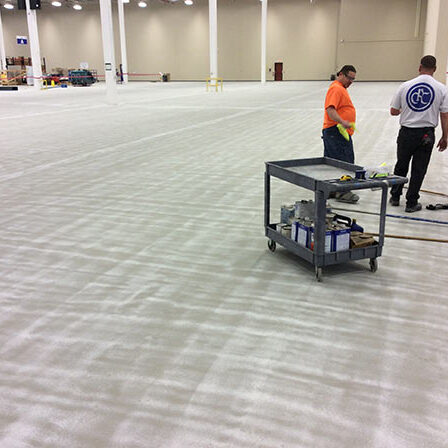
Why Surface Preparation Matters for Concrete Floor Coatings
Don’t let your new floor coating fail you.
A high-quality floor coating for your commercial or industrial building is an investment that can add durability, beauty and longevity to your floors. Depending on the type of coating you choose, it can last many years before needing to be reapplied.
However, most coatings only work the way they are intended when they properly bond to the concrete beneath. If they are applied haphazardly or under the wrong conditions, you may find your sleek new floors starting to peel, blister or otherwise fail within just a few months.
This is why it’s so important that the surface of your concrete floor is thoroughly and correctly prepared before any coating is applied.
Steps to Proper Concrete Preparation
DIY projects are often a good way to save money, but in the case of floor coatings it’s best to let an expert handle installation, since just one missed step could cost you dearly.
You want to hire a professional who understands all of the particular requirements of your particular coating system and has the proper equipment to prepare the concrete surface for the best possible bond.
If you’re not sure what you should be looking for in a contractor, ask them about their surface preparation process. Below are the general steps they should be able to describe:
Assessment and testing
Experienced flooring contractors won’t propose or promise any particular type of coating until they have a detailed understanding of your facility and any challenges it might pose.
Not only will your contractors need to listen carefully to you, but they’ll also need to conduct several tests to identify any hidden issues that could affect a floor coating’s success. These tests may include:
- Moisture Test – Water vapor coming up through the concrete, whether it’s from the ground or part of the concrete’s ongoing curing process, can cause floor coatings to bubble or blister quickly.
- Curing Compound Test – Occasionally a chemical compound will be added to concrete shortly after it’s poured to assist with the curing process. This compound can interfere with some floor coatings.
- Oil Deposit Test – Grease and other oils may leave residues that can interfere with a coating’s ability to bond with the concrete.
Removal of Previous Floor Coatings
If merely applied over an existing coating, most industrial floor coatings will either peel up or else lack the strength and durability that they have when they bond directly to concrete. Other coatings, however, may be able to be installed over another of a specific type.
Your flooring contractor should know which coatings are compatible, and which need to be removed completely. Paint and adhesive residues can also cause bonding issues and will also need to be removed.
Repairing and Preparing the Concrete Surface
An uneven concrete floor can cause problems with the final coating process, and irregularities in the surface can also create safety issues. Any obvious spalling or cracks (including regular joints) in your concrete should be repaired and filled. An expert will also be able to identify smaller imperfections or hidden weaknesses that might otherwise go unnoticed until after installation.
Some coatings also bond better when the underlying concrete has a slightly rough texture, so your contractor may use a grinder or another tool over the surface of the entire floor.
Thorough Cleaning
Once the concrete has been repaired and texturized, it will most likely need a deep cleaning to make sure all oil and residues are removed. Your contractor may choose one of several methods, including steam cleaning, an acid wash, or pressure washing.
It’s also very important that the surface of the floor be cleared of all dirt, dust and other debris immediately before the floor coating is applied, since these can be trapped under the coating and leave lasting marks in the final product.
During and After Installation
The installation process looks different depending on the type of coating being applied. Epoxy, for example, involves the application of two very different layers that chemically bond together.
However, your flooring contractors should pay attention to important steps such as environmental control (finding ways to maintain a consistent temperature and/or humidity level, despite changes in the weather).
They should also clearly communicate to you how long your particular floor coating will need to cure so that you don’t damage it by rolling heavy equipment over it before it has completely bonded to the concrete.
Ready to talk to an expert?
If you are in the Southeastern U.S. and want to make sure your next floor coating will last for years to come, give CPC Floor coatings a call at (864) 855-0600 or contact us online. We work with a wide range of clients in the industrial, commercial and healthcare industries throughout the Carolinas, Georgia, and Tennessee.
We’re very particular about our process, because we know how important it is to do each step right so that problems don’t arise. We have a 40-year history in the floor coatings industry, and we’ve built a reputation for quality work without shortcuts.
Whether you’ve already decided on a particular floor coating solution or just want to talk about what’s possible, the experts at CPC Floor Coatings will be happy to help you find the best solution for your facility.
Let’s get down to business.
For residential inquiries, call Jeremy directly at 864-934-2435.
